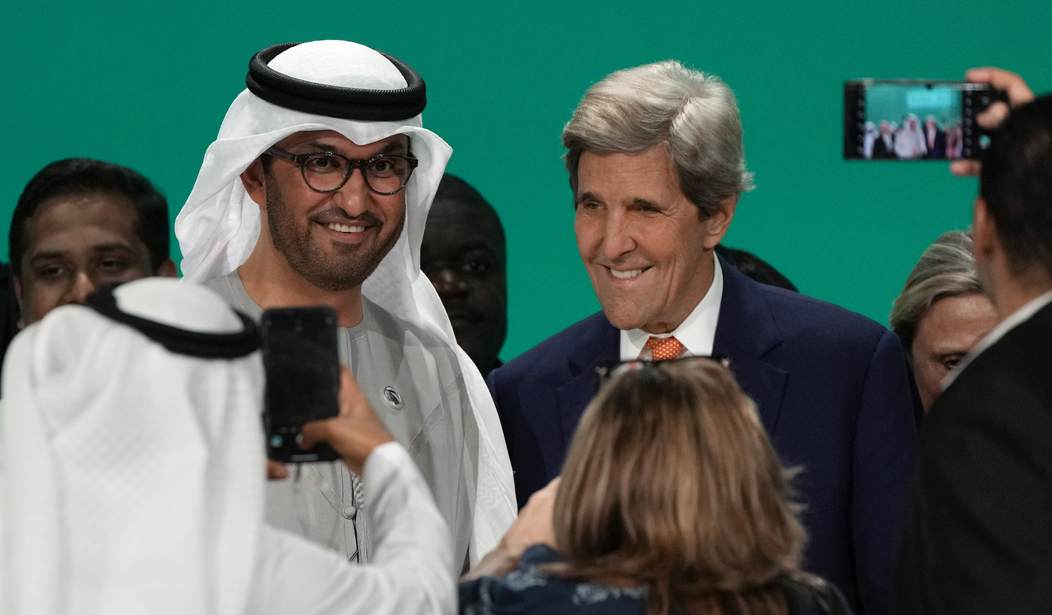In a panicked tweet, former vice president Al Gore—a champagne-socialist climate scold with a pedigree even more distinguished than John Kerry’s—warned that COP28 was “on the verge of complete failure.”
For those of you with real lives to worry about, COP28 is the short-form name of this year’s UN Climate Change Conference, the 28th such event to be held, where the great and good elites of the world gather to make ever scarier prognostications and tell the rest of us why our lives are going to have to get worse in the name of progress.
Except the consensus among those elites as the conference headed into frenzied last-minute negotiations on Tuesday was that the prognostications and prescriptions weren’t scary enough, mainly because a draft report did not call for the complete end of fossil fuels. Or as Gore put it, it was a document “Of the Petrostates, By the Petrostates and For the Petrostates.”
That’s a reference to the fact that COP28 was held in the United Arab Emirates and, credit to Gore, he sees the irony here. Governed as a federation of absolute monarchies, the UAE is a collection of fiefdoms kept afloat, both literally and figuratively, on a sea of oil. Barely 10 percent of the population are actual citizens, with the rest being made up of expats who either work in some way to get that oil out of the ground or who cater to the great wealth that it creates.
Personal hypocrisy has of course been a defining feature of the climate alarmist set from the start, whether it’s the gas-guzzling private jets that activists and celebrities like Leo DiCaprio use to zip around to such exclusive summits or, as in Gore’s case, electric bills for his Tennessee mansion that could power a mid-sized village. COP28 simply ramped up the hypocrisy to the nation-state level.
Recommended
The participants will deserve a modicum of credit—half a cheer out of three, maybe—if they stick to their guns and acknowledge the obvious reality that phasing out fossil fuels in anything like the near term is neither possible nor even desirable. But even the draft document that has so incensed greenies contains unworkable and calamitously expensive demands, like the rapid end of coal and a tripling of renewable energy in just seven years.
“Petrostates” like the UAE have gotten more sophisticated at PR, spending big bucks—still relative pittances compared to the great wealth generated by oil rents—in making shows of their “commitment to sustainability” with gestures like, well, hosting climate summits.
But when it comes to practicing what they subsidize others to preach, it’s quite a different matter.
The activists and ideologues who draw up the policy recommendations at COP28 will go back to the countries of the West that incubate and coddle them, and it is those countries who will face pressure to unilaterally “decarbonize,” sacrificing energy resilience and ordinary people’s quality of life so they can sink ever more subsidies into alternative energy sources that still aren’t ready for primetime.
The major oil and gas producers, exporters, and consumers outside the West, meanwhile, will carry on as they did before. Some, like the UAE, will pay cheap lip service to the activists, others won’t even bother with that much. But none of them will have their energy or economic policies shaped by activists who care more about abstractions and ideologies than growth or security.
So the bad news for Mr. Gore is that whatever comes out of COP28 is going to be a dead letter anyway. UN pronouncements on emissions and climate change have never truly been enforceable, and in practice it’s only the left end of the West that even tries.
The greatest irony of all is that even though the West, and the United States in particular, consumes the most energy per capita thanks to our advanced economies, we are also leading the world in reducing emissions through things like increased energy efficiency. In the U.S., carbon emissions peaked in 2007 and are roughly 2.3 percent lower now, even as the economy has grown dramatically since then.
That’s thanks to free market investments and innovation, the same things that should guide energy policy in the future. We shouldn’t be slavishly devoted to fossil fuels to the exclusion of alternatives, but we shouldn’t force-feed those alternatives when they don’t make economic or practical sense.
For all their slick marketing, the UAEs of the world understand that the point of energy is to power economies—to power people, to help them live better lives with greater possibilities. It’s not to indulge a fringe of eco-activists who would gladly make ordinary people worse off in the name of their utopian vision.
If COP28 fails, it’s because it deserved to.

























Join the conversation as a VIP Member